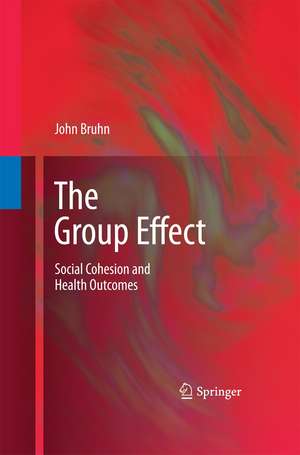The Group Effect: Social Cohesion and Health Outcomes
Autor John Bruhnen Limba Engleză Paperback – 8 oct 2014
Social cohesion has been implicated in the cause and recovery from both physical and psychological illnesses. Although there has been a large amount of work established the beneficial effects of cohesion on health and well-being, relatively little work has focused on HOW increased social cohesion sustains or improves health. This work is based on the premise that there are risk factors, including social cohesion that regulate health and disease in groups. One of the challenges is how to measure social cohesion – it can be readily observed and experienced but difficult to quantify. A better understanding of how social cohesion works will be valuable to improving group-level interventions.
| Toate formatele și edițiile | Preț | Express |
|---|---|---|
| Paperback (1) | 630.66 lei 43-57 zile | |
| Springer Us – 8 oct 2014 | 630.66 lei 43-57 zile | |
| Hardback (1) | 636.80 lei 43-57 zile | |
| Springer Us – 23 iun 2009 | 636.80 lei 43-57 zile |
Preț: 630.66 lei
Preț vechi: 741.95 lei
-15% Nou
Puncte Express: 946
Preț estimativ în valută:
120.78€ • 124.44$ • 101.18£
120.78€ • 124.44$ • 101.18£
Carte tipărită la comandă
Livrare economică 24 februarie-10 martie
Preluare comenzi: 021 569.72.76
Specificații
ISBN-13: 9781489983466
ISBN-10: 1489983465
Pagini: 192
Ilustrații: XVII, 171 p.
Dimensiuni: 155 x 235 x 10 mm
Greutate: 0.28 kg
Ediția:2009
Editura: Springer Us
Colecția Springer
Locul publicării:New York, NY, United States
ISBN-10: 1489983465
Pagini: 192
Ilustrații: XVII, 171 p.
Dimensiuni: 155 x 235 x 10 mm
Greutate: 0.28 kg
Ediția:2009
Editura: Springer Us
Colecția Springer
Locul publicării:New York, NY, United States
Public țintă
ResearchCuprins
The Significance of the Social Group.- The Concept of Social Cohesion.- Social Cohesion and Related Concepts: Social Support and Social Capital.- Cohesive Societies.- Cohesive Communities.- Cohesive Neighborhoods.- Cohesive Families.- Social Cohesion as a Mediator of Health Outcomes.
Textul de pe ultima copertă
Sociologists and anthropologists have had a long interest in studying the ways in which cultures shaped different patterns of health, disease, and mortality. Social scientists have documented low rates of chronic disease and disability in non-Western societies and have suggested that social stability, cultural homogeneity and social cohesion may play a part in explaining these low rates. On the other hand, in studies of Western societies, social scientists have found that disease and mortality assume different patterns among various ethnic, cultural and social-economic groups. The role of stress, social change and a low degree of cohesion have been suggested, along with other factors as contributing to the variable rates among different social groups.
Social cohesion has been implicated in the cause and recovery from both physical and psychological illnesses. Although there has been a large amount of work established the beneficial effects of cohesion on health and well-being, relatively little work has focused on HOW increased social cohesion sustains or improves health. This work is based on the premise that there are risk factors, including social cohesion that regulate health and disease in groups. One of the challenges is how to measure social cohesion – it can be readily observed and experienced but difficult to quantify. A better understanding of how social cohesion works will be valuable to improving group-level interventions.
Social cohesion has been implicated in the cause and recovery from both physical and psychological illnesses. Although there has been a large amount of work established the beneficial effects of cohesion on health and well-being, relatively little work has focused on HOW increased social cohesion sustains or improves health. This work is based on the premise that there are risk factors, including social cohesion that regulate health and disease in groups. One of the challenges is how to measure social cohesion – it can be readily observed and experienced but difficult to quantify. A better understanding of how social cohesion works will be valuable to improving group-level interventions.
Caracteristici
Although there have been many works linking health and well-being with social cohesion, little work has focused on how it improves well-being and health Includes supplementary material: sn.pub/extras















